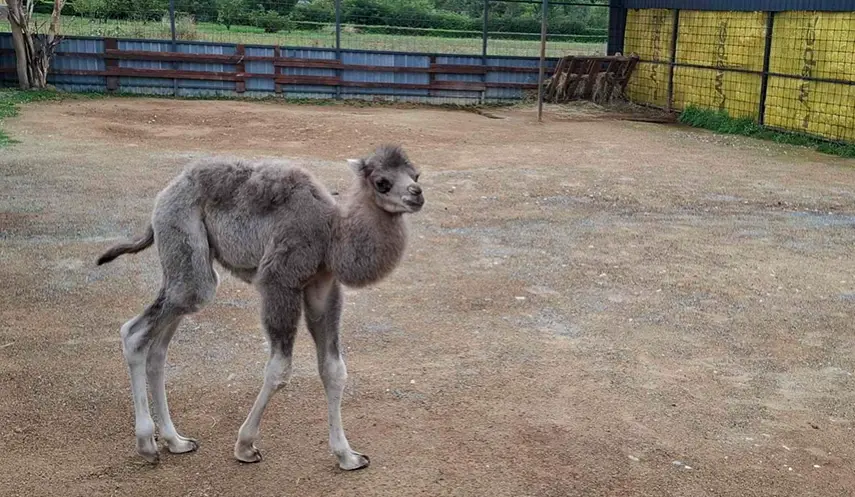CAMELS NESI AND MESI GOT A BABY CAMEL AT THE FOOT OF KOZARA
Republika Srpska - Prijedor - tourism /10/
09/08/2025
10:09

PRIJEDOR, SEPTEMBER 8 /SRNA/ - In three years of operation, the small zoo in Kozarusha near Prijedor has acquired more than 40 different species of animals and more than 270 individuals, and the latest attraction is a baby Bactrian camel that was born seven days ago.
The Aris Ranch is run by the Karahodžić family, spouses Safira and Jasmir, and their son and daughter-in-law Armin and Alma.
They have had a female Bactrian camel named Nesi for a long time, and recently acquired a male, whom they named Mesi. About fifteen days ago, they noticed the female lactating, which is how they knew a new baby was on the way.
"Alma, who is a nurse by profession, is credited with the calf's survival. Last Tuesday, one of the visitors came to tell her that the camel had started giving birth. Alma helped her and at 3:07 p.m. the baby came out, but shortly after that, her father, Mesi, hit her hard, which is cruelty that is not uncommon in the animal world," Safira Karahodžić told SRNA.
According to her, Alma, with the help of her brother and a ranch worker, managed to get the cub to safety, and then separated the male from it and its mother. The cub was unconscious for a while and they already thought it would not survive.
"And then someone who happened to be there started shouting: `It's alive, it's alive!` Alma nurtured it and at first fed it baby formula from a humane pharmacy, and then the mother, after she had rested, accepted it and started feeding it. And it's not unknown to us that females initially stay away from their cubs and don't let them even come close to them. We've had that happen with deer, so we feed them at first, and the mothers take over the cubs when they've rested from giving birth," said Safira.
In addition to deer and camels, this zoo also raised wallabies, macaque monkeys, pygmy goats, llamas, mares, a Haflinger horse, and several types of poultry.
"Kangaroos don't come out of their pouches until their fur grows back. When they do, at first, as soon as someone comes along, they run back to their mother in the pouch. The mare Ameli gave birth to Čili and they are both ready to be ridden. We use up ostrich eggs, share them with relatives and friends, sell them, and keep them as exhibits for visitors to see or hold," said Safira.
The Aris Ranch is also home to a raccoon, a nasua, a tortoise, a hawk, a snowy owl, a hawk-eagle, a German and Caucasian shepherd, several species of rabbits, an emu, an alpaca, several species of monkeys /golden-handed tamarin, ring-tailed lemur and pygmy marmoset/, golden and silver pheasants, Scottish cattle, a donkey, a Bengal and a Russian blue cat, fish, a mandarin duck, rhea peacocks, as well as canaries and parrots.
"There are other extremes of parenting. A female macaque monkey gave birth to a dead baby and wouldn't let us take it. As soon as we get close to her, she takes it and won't let it go. And she carried it like that for three days. Her male, known for the one escape when people filmed him running along the Prijedor-Banja Luka highway, is specific in that he nurtures and looks after her while she is pregnant and while the baby is still very small, and afterwards he is so aggressive towards both of them that we have to separate them. He beats them, not to mention taking their food away," says Safira.
In three years of operation, this small zoo has had thousands and thousands of visitors, mostly from the Prijedor and Banja Luka regions and the Una-Sana Canton, but also from Sarajevo, Zagreb and Belgrade, including excursions, organized visits and group visits, and Monday is the only day off.
The animal's diet includes wheat, corn, triticale, oats, barley, dates, raisins, tangerines, nectarines, oranges, bananas, bread, peas, carrots, peppers, cooked pasta and rice, meat, lettuce, spinach, and beta.
"We have a greenhouse here, my daughter-in-law and I do it, and nothing we grow goes to waste, they eat it all. Cucumbers, zucchini, eggplant, green beans, tomatoes, they want everything. The carnivores are the owl, eagle, and hawk. We also bring them fish and squid. We take almost dry food for cats and dogs, and llamas, alpacas, kangaroos, horses, cattle, camels, and donkeys, eat hay and fresh grass, as well as wheat," said Safira.
They have contracted services with a veterinary clinic, most often vaccinations and microchipping.
"There are situations when they don't know what to do, so they call Belgrade for a consultation. They ask how to microchip a camel, and they're told to climb on it. Well, I am not climbing on it, says our veterinarian," Safira said with a laugh.
She pointed out that it's a nice feeling when she gets up in the morning and greets a new resident while walking through the garden.
"You see, for example, small deer. The animals mostly do all this themselves, just like in the wild. The only thing that was stressful right now was this camel. The baby doesn't have a name yet. My granddaughter Ajna is in charge of naming the animals, and she says it's not such an easy job," said Safira. /to be continued/

SERBS IN TEARS AND FEAR OVER OWNERSHIP OF ORTHODOX CEMETERIES AND CHURCHES

CVIJANOVIĆ DEMANDS ACCOUNTABILITY FOR SHAMEFUL CONCERT IN ŠIROKI BRIJEG

OSTOJIĆ URGES BiH AND EU TO ACT OVER GLORIFICATION OF FASCIST IDEOLOGIES





